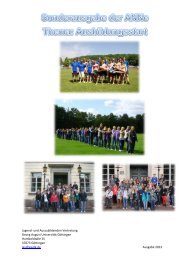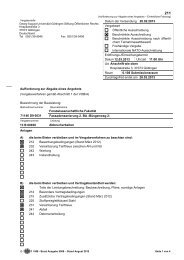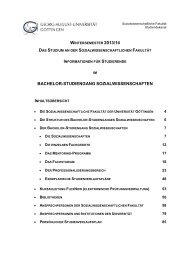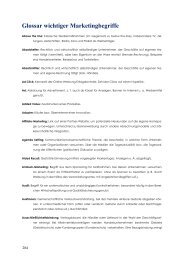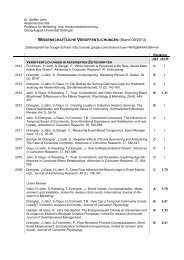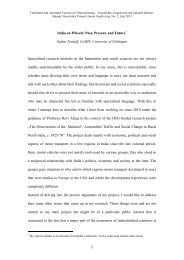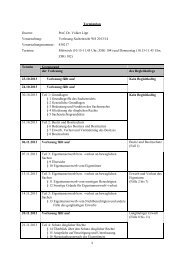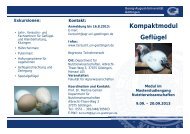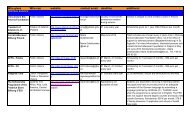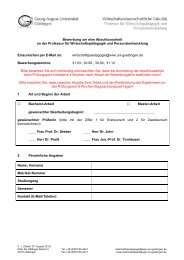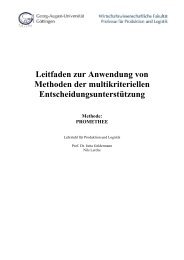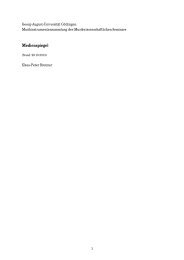CRC 990 - EFForTS - Georg-August-Universität Göttingen
CRC 990 - EFForTS - Georg-August-Universität Göttingen
CRC 990 - EFForTS - Georg-August-Universität Göttingen
Create successful ePaper yourself
Turn your PDF publications into a flip-book with our unique Google optimized e-Paper software.
<strong>CRC</strong> <strong>990</strong> Ecological and Socioeconomic Functions of Tropical Lowland Rainforest Transformation Systems (Sumatra, Indonesia) Issue 1 / <strong>August</strong> 2013<br />
page 19 von 32<br />
IV. News from <strong>Göttingen</strong><br />
<strong>CRC</strong> Colloquia and Group Meetings<br />
Colloquium series and Group Meetings take place<br />
on a regular basis to exchange and discuss research<br />
results.<br />
Research findings have – so far – been presented by<br />
C02, C03 and C07.<br />
C02<br />
Title: Science News from subproject C02<br />
Authors: Jonas Hein, Yvonne Kunz, Soeryo Adiwibowo,<br />
Barbara Beckert, Christoph Dittrich,<br />
Heiko Faust, Endriatmo Soetarto<br />
The overall goal of the research conducted by subproject<br />
CO2 is to analyze historical as well as current patterns<br />
of cultural landscape transformation in several<br />
villages in Jambi Province. Yvonne Kunz focuses on historical<br />
drivers of landscape transformation while Jonas<br />
Hein works on questions of land and resource access in<br />
the context of Indonesia’s emerging “Reducing Emissions<br />
from Deforestation and Degradation” (REDD+)<br />
framework. The two Ph.D. projects started in 2012 and<br />
are drawing on different qualitative research methods<br />
such as semi-structured interviews with land users and<br />
village heads, expert interviews with representatives<br />
of governmental and nongovernmental organizations,<br />
complemented by intensive literature and document<br />
review.<br />
First results show that landscape transformation in<br />
Jambi Province is driven by actor groups regarded as<br />
external to local actors at the village level. Large scale<br />
development interventions like the initially World Bank<br />
supported transmigrant schemes and the global demand<br />
for cash crops, such as rubber and palm oil are<br />
the main causes for cultural landscape transformation.<br />
Due to these processes a large number of people from<br />
densely populated areas in Indonesia, mainly from Java,<br />
have been resettled to sparsely populated areas like<br />
Jambi Province. In all transmigrant villages investigated,<br />
co-operations with private companies determined<br />
land use change from diverse land use towards monoculture.<br />
Basically since the reform era (1999) the former<br />
transmigrant projects are replaced by so called spontaneous<br />
migration originating from other areas of Sumatra.<br />
Both migration streams lead to land scarcity and deforestation<br />
which in turn impacted food and cash crop<br />
cultivation patterns previously implemented.<br />
For this reason, provincial and national REDD+ policies<br />
aim to create incentives for more climate and biodiversity<br />
friendly land-use practices. These land-use based<br />
climate change policies may ease the cultural landscape<br />
transformation, because it would be driven by<br />
the goal of reducing greenhouse gas emissions and<br />
achieving sustainable land use rather than by demands<br />
for cash crops. Jambi is one of Indonesia’s<br />
REDD+ pilot provinces supported by<br />
Norway. The province has recently published<br />
a province-wide action plan for the implementation for<br />
forest and land-use based mitigation activities. Additionally,<br />
the province hosts REDD+ pilot projects such<br />
as the Berbak Carbon Initiative and the Harapan Rainforest.<br />
However, the implementation of REDD+on the<br />
ground is challenged by overlapping and competitive<br />
claims over forest land, diverging interests of stakeholders<br />
and large opportunity costs for high profit land-use<br />
practices such as oil palm cultivation.<br />
Yvonne Kunz and Jonas Hein will continue field research<br />
in Jambi Province until October, 2013. The research activities<br />
are supported by Dr. Rosyani (UNJA), Prof. Dr. Endriatmo<br />
Soetarto (IPB) and Dr. Soeryo Adiwibowo (IPB).<br />
C03<br />
Title: Struggle for land bridges cultural difference<br />
Authors: Brigitta Hauser-Schäublin, Stefanie Steinebach<br />
and Rosyani<br />
The research team (three teams, each of two people) of<br />
the anthropological project (C03) carried out the first<br />
series of fieldwork in three different villages (Bungku,<br />
Markanding and Marga Mulya) of the Harapan region<br />
in 2012. The goal was to investigate to what extent<br />
cultural diversity and cultural factors have an impact<br />
www.uni-goettingen.de/de/310995.html • crc<strong>990</strong>@gwdg.de • Telephone: +49 551 39-1 21 18<br />
JFB Institute for Zoology & Anthropology • Berliner Strasse 28 • D-37073 <strong>Göttingen</strong>




